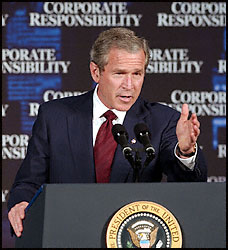Schedule of Topics
- Is morality good business?
- READ Shaw: Ch. 1—The Nature of Morality; CASE 1.1: Killer Pajamas
- MLK's 16 Apr 1963 letter...
- ACM Code of Ethics
- U.S. Govt. Standards of Ethical Conduct
- Glossary: Know These Ethical and Legal Terms
- What is a counterexample?
- Top 10 Questions to Answer
- READ Shaw: Ch. 2—Normative Theories of Ethics; CASE 2.1: Exploding Pintos & Gas Tanks
- Consequentialist Ethical Theories: Contractarianism; Utilitarianism
- Non-Consequentialist Ethical Theories: Kant, Kant's CI Test; Ross
- READ Shaw: Ch. 3—Justice and Economic Distribution; CASE 3.2: Impoverished Americans
- Stanford Encyclopedia of Philosophy: Distributive Justice
- 5th
Amendment to the U.S. Constitution; 14th
Amendment
- READ Shaw: Ch. 4 —The Nature of Capitalism; CASE 4.4: One Nation Under Wal-Mart
- PBS-FRONTLINE: Is Wal-Mart Good for America?
- READ Shaw: Ch. 5 —Corporations; CASE 5.1: The Infant Formula Controversy
- "The Social Responsibility of Business is to Increase its Profits" (Friedman)
- ENRON values & principles
- Can a Company Be charged with a Crime? —B. Goldstein
- * United States Code * TITLE 15 - COMMERCE AND TRADE
- PBS-FRONTLINE: The Merchants of Cool
- "The
Coolhunt" by Malcolm Gladwell
- READ Shaw: Ch. 6—The Workplace (1): Basic Issues; CASE 6.1: AIDS and Bagels
- Constitutional Topic: Due Process
- The U.S. Equal Employment Opportunity Commission (EEOC)
- Title VII of the Civil Rights Act of 1964
- California Labor Code
- * United States Code * TITLE 29 - LABOR
- * United States Code * TITLE 29 - LABOR * CHAPTER 7 - LABOR-MANAGEMENT RELATIONS
- * United States Code * TITLE 42 - THE PUBLIC HEALTH AND WELFARE * CHAPTER 21 - CIVIL RIGHTS, q.v. SUBCHAPTER VI
- American Federation of
Labor-Congress of Industrial Organizations (AFL-CIO)
- READ Shaw: Ch. 7—The Workplace (2): Today's Challenges; CASE 7.4: The Mommy Track
- The Occupational Safety and Health Act of 1970
- The
Americans with Disabilities Act of 1990
- READ Shaw: Ch. 8—Moral Choices Facing Employees; CASE 8.4: Ethically Dubious Conduct
- PBS-FRONTLINE: Bigger than ENRON
- Conflicts of Interest
- U.S. Patent and Trademark Office
- Patent and Trade Secrets
- * United States Code * TITLE 35 - PATENTS
- patents.com
- READ Shaw: Ch. 9—Job Discrimination; CASE 9.4: Facial Discrimination
- Discriminatory practices (EEOC)
- Implicit Association Tests (Harvard)
- Americans with Disabilities Act
- GSA Office of Civil Rights: Discrimination in the Federal Workplace
- California Equal Employment Opportunity Law and Regulations
- CALIFORNIA CONSTITUTION ARTICLE 1 DECLARATION OF RIGHTS, q.v. SEC. 31.
- * United States Code * TITLE 42 - THE PUBLIC HEALTH AND WELFARE * CHAPTER 126 - EQUAL OPPORTUNITY FOR INDIVIDUALS WITH DISABILITIES
- "A Question of Diversity" (Colb)
- "Deemed
Export Rule" FAQ
- READ: Information Ethics OUTLINE
- The Intellectual
Property Law Server
- q.v. U.S. Constitution, Article 1 Section 8
- FAQ on Information Technology Act of 2000
- PBS-FRONTLINE: Hackers
- FTC: Identity Theft
- Computer Professionals for Social Responsibility
- The Ten Commandments of Computer Ethics
- "Seven Generic Principles of Fair Information Practices"
- Privacy Basics: Generic Principles of Fair Information Practices
- SPAM case
- How to dejunk your communications channels
- Crime, Abuse, and Hacker Ethics
- * United States Code * TITLE 18 -CRIMES AND CRIMINAL PROCEDURE * PART I - CRIMES
- Computer Fraud and Abuse Act 1986 (US) 18 USC 1030
- Electronic Communications Privacy Act of 1986
- "Information Ethics" by L. Floridi
- International Center for Information Ethics
- "Business Ethics and the Information Age" by R. De George
- "A Tapestry of Privacy" by R. Mason
- Computer Ethics cases compiled by R. Barger
- Computer
Ethics (SEP)

RESOURCES
EXTRAs (not required reading)
- James Rachels: "What Would a Satisfactory Moral Theory Be Like?"
- PBS-FRONTLINE: Bigger than ENRON
- "The Right to Privacy" by Warren and Brandeis (1890)
- * United States Code * TITLE 42 - THE PUBLIC HEALTH AND WELFARE * CHAPTER 21A - PRIVACY PROTECTION
- CDT Privacy Issues
- Electronic Privacy Information Center
- ACLU and Cyber-Liberties
- "Privacy and Technology" by Gary T. Marx, Ph.D.
- FindLaw: Legal Subjects: Intellectual Property Law
- AllLaw.com: Intellectual Property Links
- * United States Code * TITLE 17 - COPYRIGHTS
- Copyright Law of the U.S.
- Fair Use of Copyrighted Works (CETUS)
- Digital Millennium Copyright Act (1998)
- U.S. Copyright Office Web Site at the Library of Congress
- World Intellectual Property Organization
- Microsoft's Anti-Piracy Website
- Glossary
- DMA
- Optoutprescreen.com